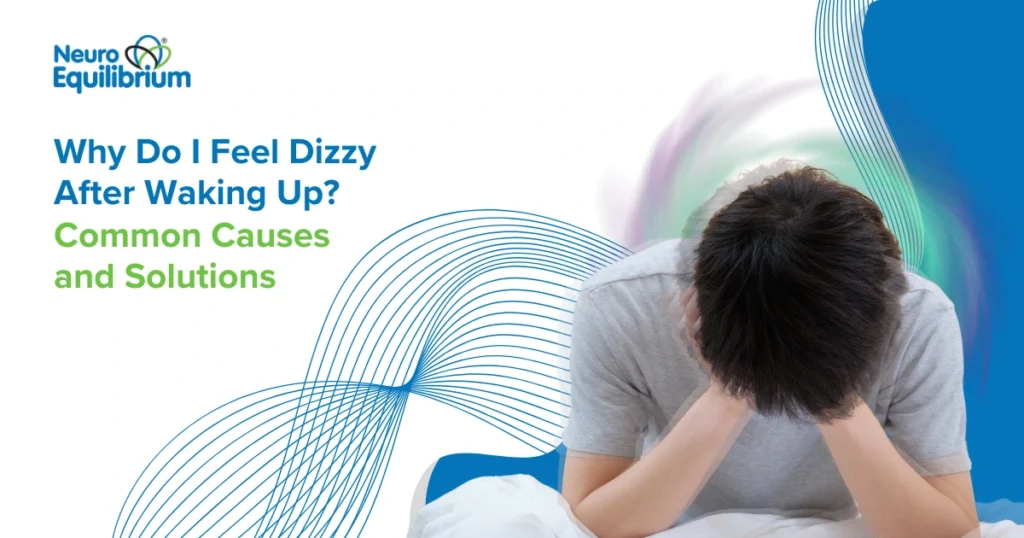Have you ever experienced after waking up, turning or sitting up in bed? Dizziness in the mornings or change in can be due to many reasons.
It is important to know the cause of morning dizziness, as it could be due to ear or brain issues. Understanding the underlying cause will help one seek the right ways of dealing with the symptoms. Dizziness may be a chronic condition as well. A specialist doctor can properly diagnose and recommend the most effective treatment plan.
Dizziness experienced on waking up needs medical attention. It may indicate inner ear (vestibular dysfunction) or brain (neurological) issues. It may sometimes be accompanied by other symptoms such as headaches, blurred vision, or difficulty in walking. Seeking help from a healthcare professional or clinics like NeuroEquilibrium for proper diagnosis and treatment is advisable.
Common Causes of Dizziness After Waking Up
Below, we explore some of the most common causes.
1. Benign Paroxysmal Positional Vertigo (BPPV)
- Triggering Movements: BPPV is one of the most common causes of dizziness, especially in the morning. It is triggered by sudden changes in head position, such as turning over in bed or getting up after lying down. Moving your head in specific ways can lead to brief but intense episodes of spinning sensations (vertigo).
- Role of Displaced Crystals: BPPV is caused by tiny calcium carbonate crystals that become dislodged from their normal position in the utricle (a part of the inner ear). They end up in one of the semicircular canals in the inner ear. The movement of these crystals disrupt the normal fluid flow in the canals, sending false signals about your body’s position to the brain, resulting in vertigo. This can be more intense in the morning when the crystals get a chance to clump together. Symptoms of BPPV may include brief but intense episodes of spinning sensations (vertigo) when you change the position of your head like bending down, turning or getting up from bed.
While BPPV can affect anyone, it’s more prevalent in older adults. In fact, BPPV can cause instability and even increase the risk of falls in older patients. If you’re experiencing this, know that effective treatments are available.
2. Blood Pressure changes (Orthostatic Hypotension)
- Blood Pressure drops: Patients with Orthostatic Hypotension experience drop in blood pressure upon moving from lying to standing position. This can result in dizziness, lightheadedness, or even fainting as on change of position, the blood supply to the brain is compromised.
- Solutions: Wait for a few seconds in sitting position before getting out of bed. A cardiologist evaluation should be done. The doctor may also need to review the medicines being taken for blood pressure. Sometimes water pills can aggravate this problem.
3. Labyrinthitis & Vestibular Neuritis
Inner ear infections like labyrinthitis and vestibular neuritis can lead to inflammation in the structures responsible for balance and hearing. This inflammation disrupts the signals sent from the inner ear to the brain, causing dizziness, vertigo, and balance problems.
- Morning Dizziness: These infections can cause worse symptoms in the morning because the body’s position changes as you wake up and begin moving. Symptoms may include unsteadiness, a spinning sensation, or difficulty in walking.
- Chronic Conditions: Recurring morning dizziness could indicate a chronic condition affecting the vestibular system. Seeking medical attention is essential for diagnosing and treating the underlying issue.
4. Medications
- Dizziness as a Side Effect: Certain medications, such as those used to treat high blood pressure, anxiety, or insomnia, can cause dizziness as a side effect. Many of these medications can affect your body’s ability to regulate blood pressure or alter brain chemistry, leading to lightheadedness upon waking.
5. Low Blood Sugar
- In inadequately controlled diabetes, blood sugar level may become low, leading to dizziness, weakness, or shakiness.
- Solution: D patients should adjust their blood sugar levels by controlled food intake and optimum medication.
What Does Feeling Dizzy After Waking Up Mean?
Morning dizziness is the sensation of being lightheaded or spinning in the morning after you have awakened. It is usually related to dehydration, sudden blood pressure changes, inner ear problems, like BPPV, low blood sugar, or sleep quality. Even though in some cases it is not harmful, frequent or severe morning dizziness could be a symptom of some underlying medical issue.
Common Causes and Quick Actions
| Cause | Symptom Example | Quick Action |
| Dehydration | Dry mouth, lightheadedness | Drink a glass of water before leaving bed |
| Low blood pressure | Faintness, weakness on standing | Sit or lie down, rise slowly |
| BPPV (inner ear issue) | Spinning when turning in bed | Try Epley maneuver, ENT consultation |
| Sleep apnea | Morning fatigue with dizziness | Seek sleep study |
| Low blood sugar | Shakiness, dizziness before breakfast | Eat a light snack, check glucose levels |
This cause–symptom–action format gives readers practical, instant takeaways.
Step-by-Step: What To Do When You Wake Up Dizzy
- Get up gradually rather than sit up and stand.
- Take one complete glass of water and then step out of bed.
- Breathe deeply and steadily to control the oxygen supply.
- Take a light snack in case dizziness can be connected with low sugar levels.
- Contact health care personnel when the dizziness persists beyond several hours or occurs daily in the mornings.
(This can be marked up with a HowTo schema for better snippet capture.)
Dizziness After Waking Up vs Other Conditions
- Dizziness in the morning vs vertigo: Morning dizziness – general wooziness or imbalance; Vertigo = spinning feelings due to imbalance in the ear/brain.
- Morning dizziness vs low blood pressure: Morning dizziness – it is generally short term; chronic low blood pressure turns into fainting and seeks medical attention.
Recovery Timeline
- Mild cases (dehydration, poor sleep): normally improve in minutes to hours.
- Inner ear-related (e.g., BPPV): Can last days to weeks untreated.
- Chronic or systemic: May recur weeks or months before the underlying cause is controlled.
When To See a Doctor
Seek medical care if:
- On waking up, dizziness takes place daily.
- You feel faint, chest pains, see blurry or feel weak.
- You have such conditions as diabetes, heart disease, sleep apnea and observe the increase of the morning dizziness.
Diagnosing Dizziness on Movement
One should see a specialist for dizzy spells.
At NeuroEquilibrium, our specialists are dedicated to diagnosing and treating balance-related disorders. We employ a comprehensive approach to identify the root cause of your dizziness through advanced diagnostic techniques. Here’s an overview of how we assess dizziness-related conditions:
Balance Tests
Our balance tests aim to determine the functional status of your vestibular system (the organ responsible for balance). Such tests help your doctor determine whether your dizziness is due to BPPV or other inner ear diseases. We employ Video Nystagmography guided positional tests to check for signs of BPPV by moving your head in specific positions and looking for abnormal eye movements called nystagmus.
Vestibular Evaluation
In patients with dizziness, a vestibular examination is done. This includes videonystagmography (VNG), Dynamic Visual Acuity, Subjective Visual Vertical, etc., to check the inner ear and brain reaction to various stimuli.

Specific Diagnostic Tests for BPPV and Vestibular Issues
Dix-Hallpike Test and supine roll test: These positional tests help diagnose BPPV by observing eye movements (nystagmus) with specific head and body movements. These tests help identify the presence and position of displaced crystals in the inner ear.
Neurological Exam
At times, dizziness may be due to diseases of the brain. At NeuroEquilibrium, we conduct a neurological assessment to evaluate for brain and central nervous system disorders. This enables us to check if your dizziness may be due to neurological conditions such as vestibular migraines, strokes, or other conditions that affect the brain.
By utilizing these advanced diagnostic tools, NeuroEquilibrium has all the tools required to accurately determine the root cause of your dizziness and develop a program to target your specific affliction.
Solutions, Lifestyle Changes, and Treatment Options for Dizziness
Managing BPPV
BPPV is caused by movement of displaced crystals in the inner ear. Once the position of the crystals is identified by VNG test, specific maneuvers like Epley, Zuma maneuver are performed to bring the displaced crystal back to its correct position.
Addressing Inner Ear Infections
Inner ear infections can cause dizziness and balance issues. Treatment typically involves vestibular rehabilitation which is customised to the needs of the patient. Vestibular suppressants should be avoided.
Medication Adjustments
Some of the medicines causing side effects are commonly associated with dizziness. Your doctor may make some alterations, including a dosage change or a change of medication.
Conclusion
Recurrent dizziness, primarily upon waking up, can be due to many reasons. Understanding what might be causing your dizziness is the first step to feeling better and starting your day right. Contact NeuroEquilibrium to diagnose dizziness and balance problems and for customized solutions that suit you.
What causes dizziness after waking up?
The causes of waking up with dizziness include dehydration, low blood sugar, Benign Paroxysmal Positional Vertigo (BPPV), and inner ear or brain disorders. Proper diagnosis is essential since some situations can be dangerous and require treatment. Though some dizziness may pass after a few days, if it continues longer, it is advised that you seek medical advice so a complete assessment can be made and the best treatment recommended.
Book a consultation at your nearest NeuroEquilibrium Clinic today.
What are the common treatments for morning dizziness?
Management of morning dizziness depends on the cause or origin of the condition. In BPPV, a specific maneuver is helpful in effectively repositioning misplaced crystals in the inner ear. Lifestyle changes like getting up slowly from the bed, drinking enough water, adequate sleep. Treatment plans can be prescribed depending on the symptoms or other conditions a disease patient may suffer.
Book a consultation at your nearest NeuroEquilibrium Clinic today.
















